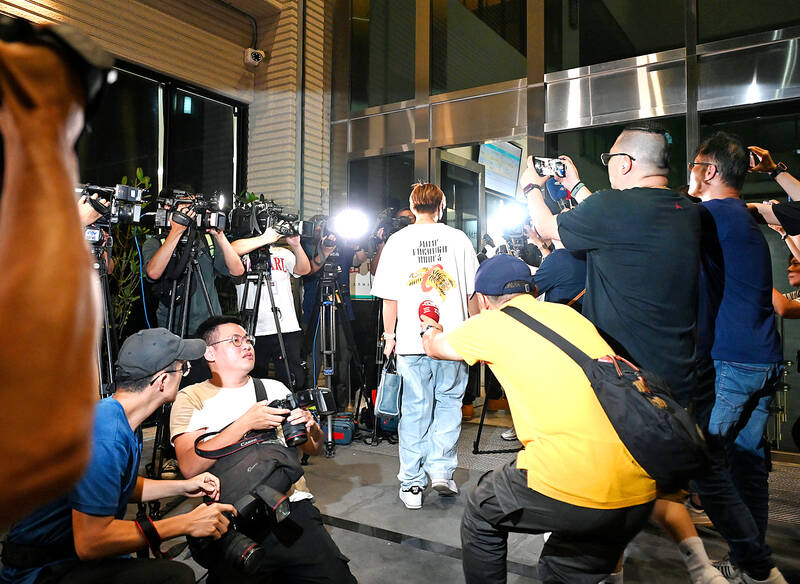Singer and actor Aaron Yan (炎亞綸) was given a seven-month suspended prison sentence yesterday for filming and leaking intimate videos of a minor in 2017 and 2018.
In its ruling, the Shilin District Court said that Yan, 39, had recorded the videos of him having sex with a minor with the intention of sharing them.
The court handed down a seven-month prison sentence, which was suspended for three years and can be commuted to a fine, after Yan reached a settlement in March with the accuser, an Internet personality named Raku (耀樂), the ruling said.

Photo: Wang Yi-sung, Taipei Times
The amount of the settlement was not disclosed, as there was a confidentiality agreement between the two men, the court said in its verdict, which can be appealed.
In addition, Yan received another sentence of four months in prison for contravening the Personal Data Protection Act (個人資料保護法) for having sent the images to two people.
The four-month jail term was also suspended for three years, but cannot be commuted to a fine.
In the case that came to light in June last year, Raku accused Yan of forced sexual intercourse at the latter’s home, filming the acts without his consent and leaking the videos.
The acts took place from December 2017 to June 2018, when the two were in a relationship, Raku said, adding that he was 16 at the time and Yan was in his early 30s.
Prosecutors decided not to pursue an indictment against Yan for rape due to a lack of evidence.

A strong continental cold air mass is to bring pollutants to Taiwan from tomorrow, the Ministry of Environment said today, as it issued an “orange” air quality alert for most of the country. All of Taiwan except for Hualien and Taitung counties is to be under an “orange” air quality alert tomorrow, indicating air quality that is unhealthy for sensitive groups. In China, areas from Shandong to Shanghai have been enveloped in haze since Saturday, the ministry said in a news release. Yesterday, hourly concentrations of PM2.5 in these areas ranged from 65 to 160 micrograms per cubic meter (mg/m³), and pollutants were

Taiwan’s armed forces have established response protocols for a wide range of sudden contingencies, including the “Wan Chun Plan” to protect the head of state, the Ministry of Defense (MND) said today. After US President Donald Trump on Saturday launched a series of airstrikes in Venezuela and kidnapped Venezuelan President Nicolas Maduro, concerns have been raised as to whether China would launch a similar “decapitation strike” on Taiwan. The armed forces regularly coordinate with relevant agencies and practice drills to ensure preparedness for a wide range of scenarios, Vice Minister of National Defense Hsu Szu-chien (徐斯儉) told reporters before a

EVA Airways on Saturday said that it had suspended a pilot and opened an investigation after he allegedly lost his temper and punched the first officer several times as their plane was taxiing before takeoff at Los Angeles International Airport. According to a report published on Thursday by The Reporter, the incident occurred after the flight’s Malaysian first officer tried to warn the Taiwanese pilot, surnamed Wen (文), that he was taxiing faster than the speed limit of 30 knots (55.6kph). After alerting the pilot several times without response, the first officer manually applied the brakes in accordance with standard operating

NOT AN OPENING: Trump’s violation of international law does not affect China’s consideration in attacking Taiwan; Beijing lacks capability, not precedent, an official said Taiwanese officials see the US’ capture of the president of Venezuela as a powerful deterrent to Beijing’s aggression and a timely reminder of the US’ ability to defeat militaries equipped with Chinese-made weapons. The strikes that toppled Venezuelan President Nicolas Maduro signaled to authoritarian leaders, including Chinese President Xi Jinping (習近平), US President Donald Trump’s willingness to use military might for international affairs core to US interests, one senior official in Taipei’s security circle said. That reassured Taiwan, the person said. Taipei has also dismissed the idea that Trump’s apparent violation of international law could embolden Beijing, said the official, who was not